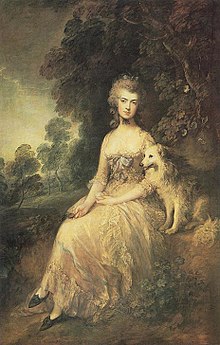Mary Robinson (poet)
| Mary Robinson | |
|---|---|

Portrait of Mary Robinson by Thomas Gainsborough, 1781
|
|
| Born |
Mary Darby 27 November 1757 England |
| Died | 26 December 1800 (aged 43) England |
Mary Robinson (née Darby) (27 November 1757? – 26 December 1800) was an English actress, poet, dramatist, novelist, and celebrity figure. During her lifetime she was known as "the English Sappho". She earned her nickname "Perdita" for her role as Perdita (heroine of Shakespeare's The Winter's Tale) in 1779. She was the first public mistress of King George IV while he was still Prince of Wales.
Robinson was born in Bristol, England to John Darby, a naval captain, and his wife Hester (née Seys). In her memoirs, Robinson gives her birth in 1758 but the year 1757 seems more likely according to recently published research (see appendix to Byrne, 2005). Her father deserted her mother and took on a mistress when Robinson was still a child. The family hoped for a reconciliation, but Captain Darby made it clear that this was not going to happen. Without the support of her husband, Hester Darby supported herself and the five children born of the marriage by starting a school for young girls in Little Chelsea, London, (where Robinson taught by her 14th birthday). However, during one of his brief returns to the family, Captain Darby had the school closed (which he was entitled to do by English law). Robinson, who at one point attended a school run by the social reformer Hannah More, came to the attention of actor David Garrick.
Hester Darby encouraged her daughter to accept the proposal of an articled clerk, Thomas Robinson, who claimed to have an inheritance. Mary was against this idea; however, after being stricken ill, and watching him take care of her and her younger brother, she felt that she owed him, and she did not want to disappoint her mother who was pushing for the engagement. After the early marriage, Robinson discovered that her husband did not have an inheritance. He continued to live an elaborate lifestyle, however, and had multiple affairs that he made no effort to hide. Subsequently, Mary supported their family. After her husband squandered their money, the couple fled to Talgarth, Wales (where Robinson's only daughter, Mary Elizabeth, was born in November). Here they lived in a fairly large estate, called Tregunter Park. Eventually Her husband was imprisoned for debt in the Fleet Prison where she accompanied him for many months. During this time, Mary Robinson found a patron in Georgiana Cavendish, Duchess of Devonshire, who sponsored the publication of Robinson's first volume of poems, Captivity.
...
Wikipedia
